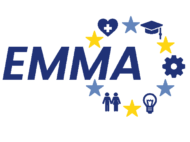EMMA “Master’s in Active Ageing and Age-friendly Society”, an Erasmus Strategic Partnership program preparation started in autumn 2020. Six European countries, Austria, Finland, Greece, Ireland, Portugal and Slovenia were awarded Erasmus + Strategic partnership fund for three years. The aim is to develop a master level programme, scheduled to be ready for accreditation in autumn 2023. After that the recruitment for students from the six partner countries will open and students from around Europe and the wider world will be invited to join the programme.
The World Health Organization (WHO) currently considers the ageing of the population as the most significant medical and social demographic phenomenon worldwide. The Member States and Partners of the WHO, have created a Global Strategy and Action Plan for Ageing and Health “The Decade of Healthy Ageing 2020–2030. The WHO has defined healthy ageing as “a process of maintaining functional ability to enable wellbeing in older age”.
EMMA universities, in Austria, Finland, Greece, Ireland, Portugal and Slovenia, are working together to build a joint master’s level program to educate future professionals from different disciplines, who are able to create new interdisciplinary knowledge, skills and innovative practices to develop age friendly societies. The objectives of the EMMA project are described in more detail on the EMMA website https://www.emma-master.eu/ and IkäNYT! publication as well as on the Erasmus website https://ec.europa.eu/programmes/erasmus-plus/projects/eplus-project-details/#project/2020-1-FI01-KA203-066477
The aim of the Master’s Programme is to provide students from different educational and professional backgrounds with advanced and future oriented competencies. The graduates will be able to take the lead in all spheres of life, in the development of the concept of and practices in active ageing and an age-friendly society in the European and global context.
The EMMA project has seven work packages, and all partner universities work together in all of them to co-develop the program. At the moment, the work packages in progress focus on needs analysis, the construction of a curriculum framework, defining the core and elective competencies and mapping the current pedagogical practices and e-learning facilities of the partner institutions.
Basis for the curriculum development
The curriculum framework is the foundation of any educational programme but is somewhat a complicated process. Even though the European Higher Education Area was launched in March 2010, on the occasion of the 10th anniversary of the Bologna Process, another ten years have passed and there are still rather different regulations, requirements, standards and practices in different EU member countries and their Universities: e.g. the scope and duration of master’s level education, degree titles, required number of credits, entry requirements and fees, to mention just few. Developing a joint EMMA program, it is important to find common starting points in order to create a curriculum that serves all partners and attracts students with varied background across Europe. Developing the pedagogic framework is a fascinating learning opportunity for all the partners: how we understand learning, how we see the role of teaching in developing new competences and what kind of learning processes we want to promote. Educational, social and personal cultures also add to the mix, which make the working in this consortium stimulating, and also rewarding learning process. We trust that this mix will create an innovative educational opportunity to enhance the EU role at the forefront of active and healthy ageing.
Learning entities are developed with the support of on-line pedagogy
The development of the curriculum itself started in March 2021, by first defining together the desired qualities of future graduates. This was a thought-provoking and challenging exercise, but we all came out with similar qualities by different names and expressions. This gives confidence for future work, emphasising the importance of open discussion, listening and flexibility in our approach. It also demonstrates the importance of sharing ideas to explore and deepen our own understanding of pedagogical values
The desired competencies of the future graduates and learning outcomes can now be worked on from the common understanding of the goal and the graduate qualities of EMMA programme. This is a work in progress and will continue with the design of the modules in the autumn.
From the pedagogical framework, the on-line pedagogy will be developed. This is an important link when designing the EMMA program, which is to be offered fully on-line and in English language. Work focusing on e-pedagogy and tools, includes both the development of on-line pedagogy and the analysis and development of common e-learning environments. This may be challenging due to the different virtual systems and levels of engagement with e-learning in partner universities. However, in the past year the Covid-19 pandemic has thought all of us to adapt to and adopt on-line learning environment and working, which we embraced fully during our project work.
In order to safeguard the well-being and active and meaningful life of the ageing population into the future, EMMA project is developing a cross-discipline, cross-national and cross-cultural on-line programme in English language. This will offer opportunities for students around the world to advance and co-develop knowledge, skills and competencies around this locally, nationally and globally important theme, active aging and age friendly society.
Author information:
Raija Kuisma, PhD, MSc, MCSP, Principal Lecturer of Physiotherapy, EMMA Project Director, Karelia University of Applied Sciences, Finland raija.kuisma@karelia.fi


